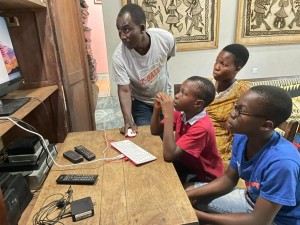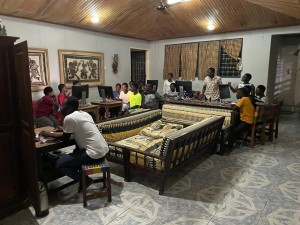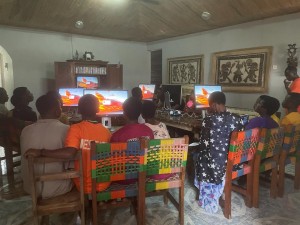In the summer of 1970 when my son Stephen was in high school, he came home one night at 11 o’clock as excited as I’d only seen him once before when he first saw crashing ocean waves on a beach in Oregon. He had just learned how to program that huge computer taking up the space of a whole building at Western Washington University to give him random numbers. “5837942 “ he exclaimed as he went through the reams of paper on the living room floor “who ever would have chosen that as a random number?” Well, our students in Mpeasem/Cape Coast, Ghana are experiencing a similar reaction thanks to Stephen’s lifelong play with computers. As they work with the six new Raspberry Pi computers that Stephen prepared for them and I hauled here to West Africa for them, they are learning about computer programming.
We have a group of twenty one students (eighteen of them living at the house) who are here for two weeks of tutoring during their school break. They are unbelievably excited about computer programming. For two nights in a row they have been glued to those monitors (four students on three chairs in front of each of the five 24” HP monitors) until 11 o’clock at night and up again in the same place at 6 the next morning. I had no idea this project would turn out so well.
I didn’t know that these bare bones little $100 computers contained in a small simple key board were perfect for teaching and learning computer programming. I didn’t know that Daniel Osei who is our managing director had studied computer programming while at Ashesi University and would be delighted to share his knowledge with our students. And, most importantly, I didn’t understand that our students would be so willing, happy and able to stretch their minds. I thought they would be learning about word processing and spread sheets, not how to tell a computer what to do. Lovely things happen sometimes here in West Africa.
Kathryn Roe
p.s. The above story could not have happened without the help of Bob McDonnell and Larry and Alisa Roe and, of course, Stephen Roe. Thanks.



